Lorem ipsum dolor sit amet, consectetur adipiscing elit. Ut elit tellus, luctus nec ullamcorper mattis, pulvinar dapibus leo.
Lorem ipsum dolor sit amet, consectetur adipiscing elit. Ut elit tellus, luctus nec ullamcorper mattis, pulvinar dapibus leo.
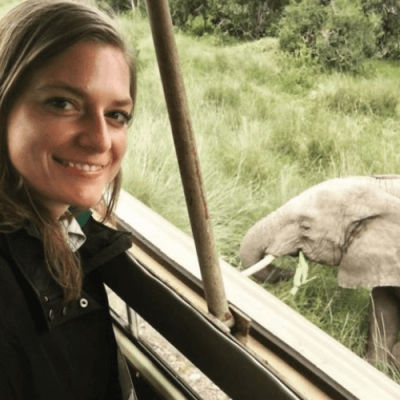
Imagine a girl who’d never even been camping, whose parents never went to college, growing up to become a globe-trotting wildlife biologist studying elephants, tigers, and coyotes.
Sounds unlikely, right?
Yet, that’s my story!
Let me tell you how it all happened…
I wasn’t the
smartest kid in my class, I didn’t have strong mentors to show me the way
in the beginning…
…and my family wasn’t even outdoorsy; we “camped” by staying in hotels at state parks!
I grew up LOVING animals and this was something taught to me by my parents through experiences. Some of the best memories in life are looking for animals with my family.
These weren’t extraordinary animals, just common animals we saw in our every day life growing up in Buffalo, NY. My mom took me to the library and we would watch ducks in the creek behind before we went in, my dad and I would lift up rocks in our yard to discover what lived underneath, and we would catch (and release) frogs and snakes at nearby ponds.
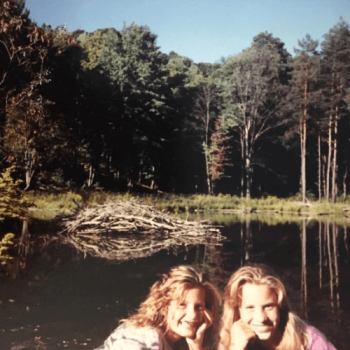
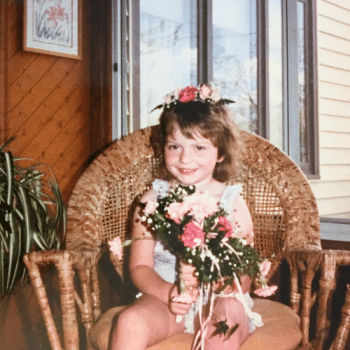
My favorite animal memories were at Allegheny State Park. We took “splash hikes” where we put on old sneakers and traversed through creeks overturning rocks to find salamanders and crayfish and visited beaver ponds at dusk, throwing wild apples into the pond to watch them eat. My absolute favorite though was driving around the park at night with a spotlight to see the animals that came out at night like raccoons, opossums, and skunks.
Along with loving animals and getting dirty playing in the grass and around ponds, I also loved “fancy” things like dressing up in my mom’s clothes, putting on her makeup, walking in her high heel shoes, and preparing my Barbies and My Little Ponies for their dates.
My parents taught me to love ALL the animals – the “ugly” ones, the common ones, the forgotten ones, even the ones that annoy you or cause problems in your yard or home.
When I was 11 years old, my life took an unexpected turn. I got a brochure in the mail on becoming a student ambassador in Australia and New Zealand. I didn’t know anything about these countries, but when I saw the photos in the brochure, I knew that I had to go. My family had never been out of the country though! (except Canada which was 30 min away by car). I asked my dad, took the risk, applied for the program, and was accepted. At the time, family members criticized our decision. They thought I was too young and that I wouldn’t appreciate or understand the trip. In retrospect, I know this trip played a deep role in me becoming a wildlife biologists today. I flew across the world with a group of strangers for three weeks and got to experience completely new ways of life.
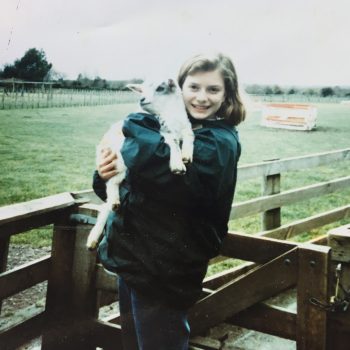
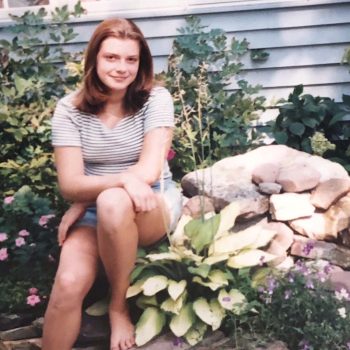
For a long time, I regretted my decision on college. I wasn’t sure on what I wanted to be, where I wanted to go, or how to even search for colleges (this was before the Internet was really useful) and ended up going to a local school and living at home. I thought I wanted to be an actress because I loved good film and television, but was insecure, shy, and struggled with body image issues. In high school, I was never cast in any speaking roles and I didn’t even make the cut for productions in college. I still pursued acting, but had biology as a backup career so that I could be a medical doctor, a stable and prestigious career, if acting failed. During this time, I spent a summer living in New York City with my brother take acting classes. It was an amazing experience.
Before my last year, my brother recommended that I study abroad. I really admired him and although it was random because I didn’t need the credits, I decided it was a good idea, and it just sounded like fun. I visited the Study Abroad office at my university and collected dozens of pamphlets, spread them over my bed, and agonized over which program I should pursue. All the programs were all in Europe to study theater or film, except for one of them: the School for Field Studies in Kenya (SFS) on wildlife management. I had no real reason to go to Kenya, and in fact, give my career goals were in acting, it didn’t make sense for me to go. But just like Australia and New Zealand, I felt compelled to go and thought that I would never be brave enough to go to Africa alone later in life.
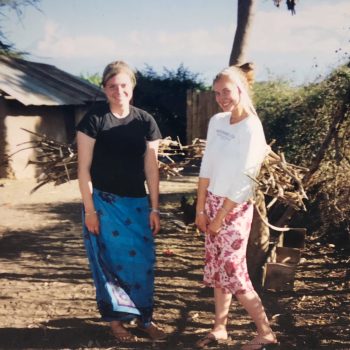
In Kenya I realized I could have a career in wildlife biology. Before I only knew of Jane Goodall, who moved to remote Tanzania to study chimpanzees. I was too scared to do that, but at SFS, I realized there was a spectrum of career options including positions in the US.
After Kenya, I had direction; I now knew I wanted to go to graduate school to become a wildlife professional, but I still didn’t know for what and exactly what I wanted to be. I took three years to work various internships to help me figure this out. First, I worked for the Bureau of Land Management in St. George, Utah updating water catchment maps. This internship was really hard for me and I almost quit. St. George was different culturally and I had to work with a challenging co-worker. For the six months I was there, I didn’t develop any friendships and was very isolated, but I persevered through and got to do some cool things like bat tracking research in the northern Grand Canyon, and this led me to my next internship, which I loved.
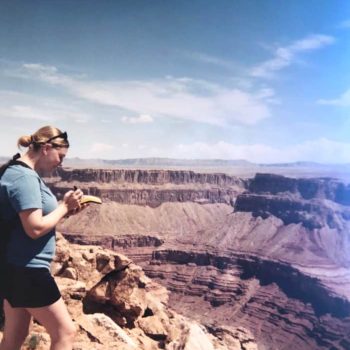
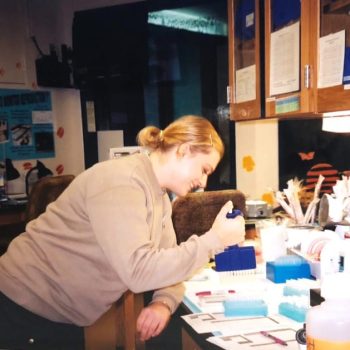
My next internship was in Disney World. No, I wasn’t a Disney princess (although I would have loved to be Ariel!); I worked at the Wildlife Tracking Center in Animal Kingdom monitoring the hormones of the captive animals at zoo. For example, one of the elephants was pregnant and very close to giving birth. The gestation period of elephants is about two years, so we needed to monitor her hormones daily to look for signals that she would be giving birth soon, and therefore alert the veterinarians. I was also able to participate in other fun projects like collecting poop for hormone analysis for the critically endangered cotton-top tamarin, surveying wildlife on undeveloped land within Disney property, and collecting alligator vocalizations.
My last internship was with the School for Field Studies in Kenya, where I previously attended as a study abroad student. I applied for this internship once before, but didn’t get it, so I took a semester to get my EMT (Emergency Medicine Technician) certification to make me more competitive for living in rural Kenya. I mostly helped run the program for students, but I also got the opportunity to collaborate with the wildlife professor on ecotourism research. We interviewed tourists and followed them on safari to record what animals they stopped for and how long. I co-wrote two publications, one of which is still my most cited! In between semester breaks, I traveled across Kenya and visited Rwanda, Uganda, and Tanzania. This internship was also not easy and again, I almost quit, but found it in myself to push through.
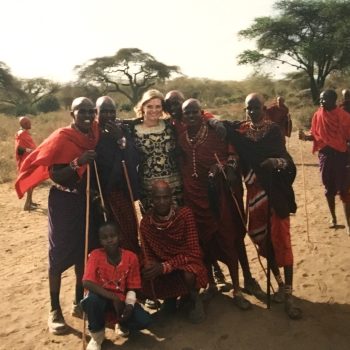
In Kenya, I fell in love with elephants.
I later studied forest elephants for my Ph.D.
In Kenya, I fell in love with elephants.
I later studied forest elephants for my Ph.D.
01
I’m learning Portuguese! My partner is from Brazil and I practice every day.
02
My Ph.D. dissertation used non-invasive genetics and my advisor was an expert at genetics, but in college Genetics was my worst course – I got a C!
03
My favorite Disney movie is The Little Mermaid. My best friend and I stood in line for 30 minutes to meet Ariel in Disney World when we were 22 alongside a bunch of 6 year olds with their parents
04
I LOVE reality TV: Love is Blind, the Housewives, Bachelor/Bachelorette, the Kardashians, RuPaul’s Drag Race are some of my favs.
05
I’m spiritual and into manifestation (which is simply visualizing and believing in a specific outcome for your future before it happens)
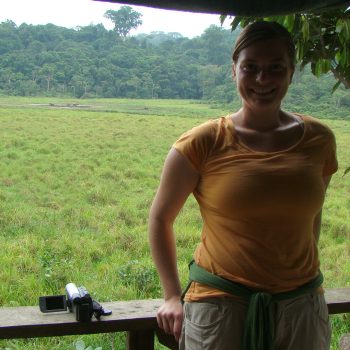
The following year, I started my Ph.D. I knew I wanted to study large vertebrates, and preferably internationally, but that was it! My advisor was a geneticist, so as long as my project involved genetic research, I was good to go and could study whatever I wanted. It was amazing to have the academic freedom to chose whatever I wanted to study, but I was also overwhelmed because I could choose from almost anything in the world. I struggled for half of a year on this, but after being introduced to an interesting data set on African forest elephants from my advisor’s colleague, I found something intriguing to be the stepping stone for my research.
I spent the next few years collecting data in Gabon and running genetic analyses on DNA from dung samples in the lab. I observed elephant groups, identified individuals, and tried to collect fresh dung from them. From group observations, I made network models of the elephants and overlaid their genetic information to see if related individuals were more likely to be group members. I also organized transects across the park, looking for as much dung as possible, to see if dung found closer together was from more closely related individuals. My field work brought me many amazing adventures including traveling by canoe to remote parts of the Republic of Congo, being surrounded by hundreds of mandrills, and even having an elephant trying to break into my room.
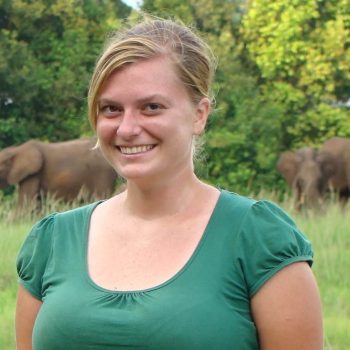
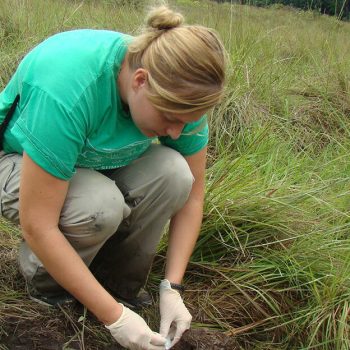
Graduate school was challenging! I had a severe case of imposter syndrome, struggled with anxiety, depression, and migraine headaches. I felt so inadequate that I didn’t ask any questions in class or seminars throughout graduate school. I loved my research, but I never felt like I belonged. Most of my classmates didn’t wear any makeup and many wore field clothes even when they weren’t in the field. They “looked” like ecologists, while I did not.
In my frilly tops, make up, and jewelry, I started to worry that people would not take me seriously. This was compounded by the messaging and culture of academia. Many thought that time spent away from science is not time well spent. I was paranoid that people would look at my appearance and think that I was shopping and applying makeup all the time, when it really only took a few minutes of my day. I became severely stressed because I felt so behind, and again wanted to quit.
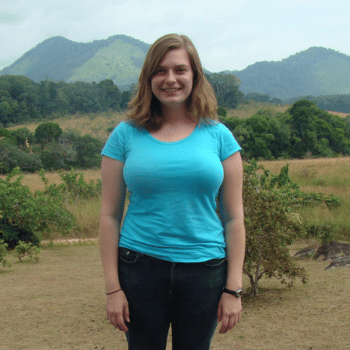
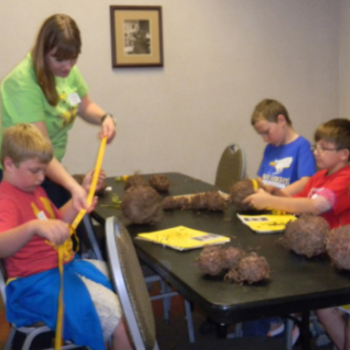
What really turned things around for me and gave me the motivation to keep going was working with kids. I was selected to participate in the GK-12 National Science Foundation program where I worked with teachers to co-create lesson plans based on my own research. Working with teachers reminded me how cool my research was, and then introducing it to their kids in the classroom took it one step further. The fifth graders I taught were so eager and excited to learn from me. They asked in-depth and off-the-wall (but good) questions about my work and allowed me to see my science for what it was: a quest for truth-seeking in nature on something that nobody has ever studied before.
One of my life goals is to
pass on my mom’s
legacy of loving,
and being kind to, animals and nature.
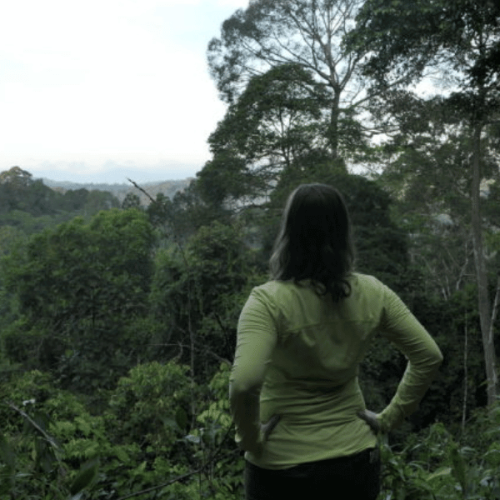
One of my life goals is to
pass on my mom’s
legacy of loving,
and being kind to, animals and nature.
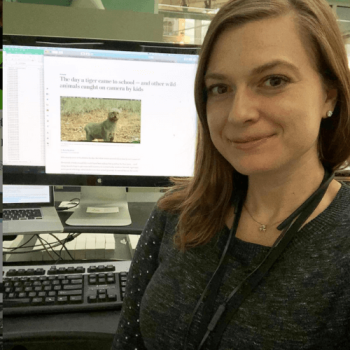
After I graduated, I was ready to move and start my new life as a wildlife biologist in a permanent position. I applied for jobs all over the country and was shocked that people only saw me as a geneticist or an elephant biologist. I knew that academia was competitive, but I had no idea how hard it was to get a permanent job. I now had a husband and lots of pets, so I could no longer look abroad for jobs, which was where most of the elephant jobs were, and although I appreciated genetics as a tool, it wasn’t my true love. I was reluctant to look for temporary postdoc positions, because I really wanted to move somewhere permanently and stay there.
I decided to apply for a postdoc at the North Carolina Museum of Natural Sciences on the eMammal project, where I would be working with teachers to implement camera trap research into their classrooms for kids to collect data for real science. I got this position and it changed my life.
I worked on highly collaborative projects with remarkable mentors and teammates. During this period, I blossomed as a scientist. I developed confidence and learned how to think big and creatively. Feeling empowered by the success of our program and the ability for kids to contribute to research, we set up projects in dozens of schools around the world in North Carolina, Kenya, Mexico, and India. I found my dream job…but it was temporary.
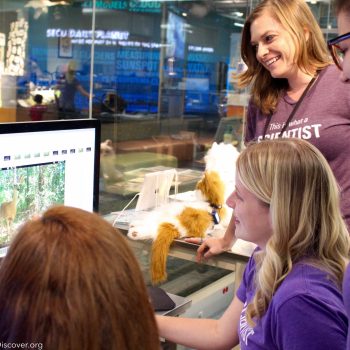
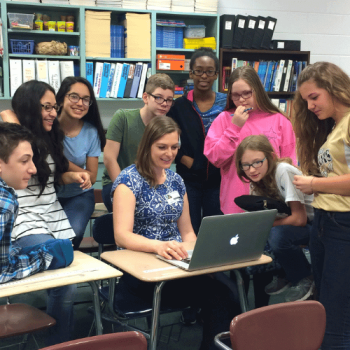
During this time, I also had a major a-ha moment. This entire time I decided to go into research to help animals, yet I didn’t feel like I was doing much to help them. My research on the critically endangered forest elephant was cool, but they were just being poached to death – they didn’t need research to save them, they needed the poaching to stop. I realized that in order to solve this conservation problem, we needed to study the humans, not the animals.
As I continued to work with kids and started to conduct social science research on their perceptions towards wildlife, I also realized that people’s attitudes towards conservation form when they are young children. If they are never introduced to and get to experience nature, then they most likely grow up not caring. I realized then that to really solve conservation problems that working with kids was the answer.
Working at the museum accelerated my love of outreach. I LOVED giving talks on stage and writing about our camera trap research – so much so – that I created my own blog. Here I was free to write all about my experiences, point of view, and share fun photos of my adventures.
My time with eMammal was almost up. I absolutely LOVED my job, but my position was grant-funded, meaning temporary. I applied for grants to try to make my postdoc sustainable, but unfortunately had no luck. I kept on searching for jobs, but I realized that I would rather spend more time writing on my blog.
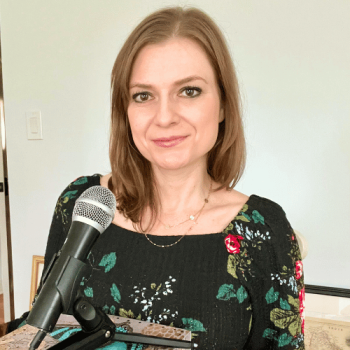
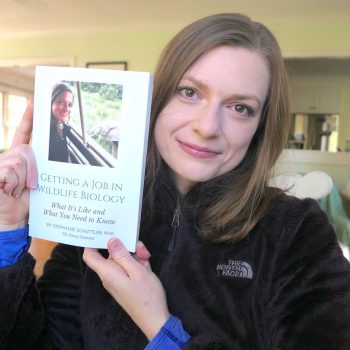
I also blogged about something a lot of people were talking about, but not publicly: struggles on the job market. By now I had been at eMammal for four years and although I got lots of interviews for jobs, someone who had more experience was always chosen for the position, leaving me without a permanent job and my time running up at the museum. I limited my search to Raleigh because I bought a house there, but I was still surprised at how hard it was to get a permanent job in the “research triangle.” I wasn’t the only one going through this – ALL of my colleagues were, but I opened up about it to be transparent and help others.
Working with teachers taught me to fully embrace my fancy side. In graduate school, although I loved dressing up and wearing makeup, I didn’t feel comfortable doing it because I was worried people were judging me. Although I was still a little fancy, I held back, and quite honestly, it didn’t feel that good.
When I started working at the museum, the culture was different and I didn’t feel uncomfortable embracing who I really was. I started to dress up again and when I worked with teachers, they kept telling me how fancy I was. Because of the stereotype scientists have, they were not expecting this from me and called me a Fancy Scientist. I loved the name and changed my social media to reflect this.
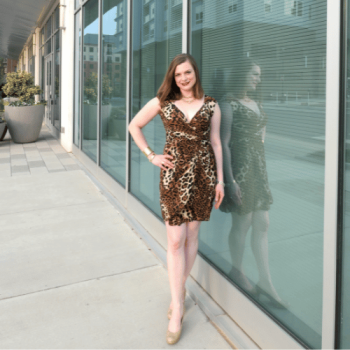
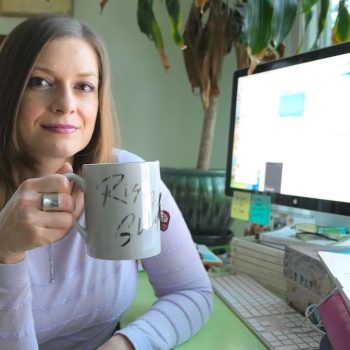
At that time I was also listening to a lot of podcasts and taking free courses on how people made full-time livings from their blogs and creating programs to help people. Because I loved writing and other science communication so much, and had this epiphany when it came to conservation, I decided to take a gigantic leap of faith and go full in on my blog.
In 2020, a month before the pandemic, I made this transition and opened up my own business, the Fancy Scientist LLC. I now work full time on science communication through my blog, books, videos, podcasts, and more, and mentor and create programs for aspiring, young, and/or struggling professionals in wildlife careers.
If you’ve gotten this far – wow, I’m impressed! Thank you so much for reading my story! I hope it offered you the courage to pursue your passions in life no matter where you currently are. Are you in or interested or currently in a career in wildlife, ecology, zoology, conservation biology, or environmental science and need some help? I’d love to work with you. Click below to find out how.
I look forward to interacting with you on our journey together learning about wildlife, conservation, and associated careers. Engage with me on social media to share your thoughts and connect!
© All rights reserved 2024
I understand that inbox can be a lot and I respect your decision. If there’s anything you’d like to share or discuss with me in the future, don’t hesitate to get in touch.
We need the email you signed up with.
You have successfully joined our subscriber list.
I understand that inbox can be a lot and I respect your decision. If there’s anything you’d like to share or discuss with me in the future, don’t hesitate to get in touch.
We need the email you signed up with.
You have successfully joined our subscriber list.
Before we say our goodbye, I want to remind you that you have been an essential part of my journey. If there’s anything you’d like to share or discuss with me in the future, don’t hesitate to get in touch.
We need the email you signed up with.
You have successfully joined our subscriber list.
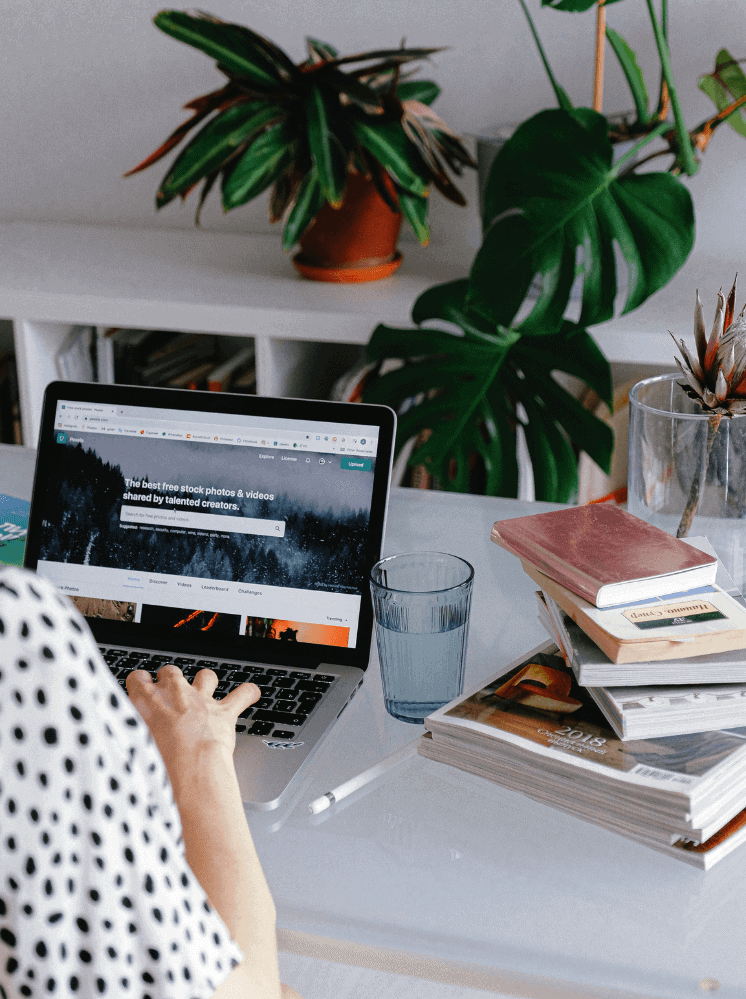
And get the 100+ Job Titles .PDF FREE!
Fill in the form below to be the FIRST notified once we open up our doors
Free Download
GIVE IT TO ME